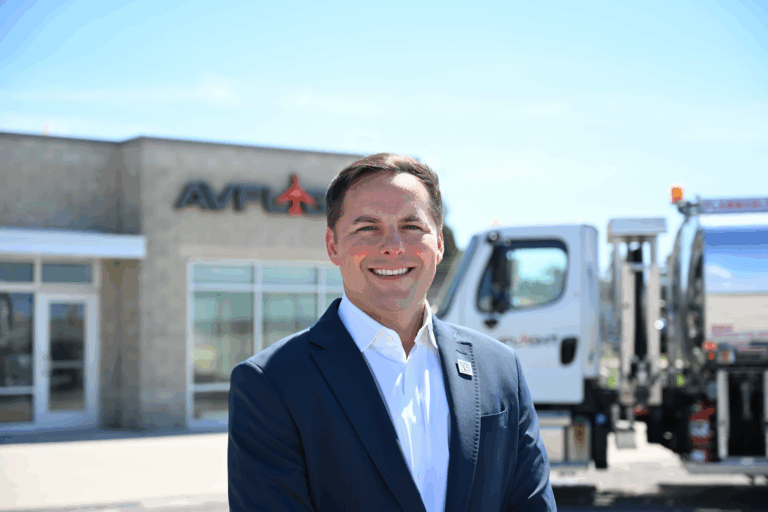The aviation industry’s commitment to achieving net-zero carbon emissions by 2050 isn’t just talk for Avflight Corporation. The operator of 26 full-service FBOs across North America and Europe has already electrified significant portions of its ground support equipment and installed eVTOL charging stations at multiple locations.
“At its core, Avflight exists to serve its communities worldwide,” explains Joe Meszaros, the company’s vice president of operations. “That service extends to community stewardship in the form of sustainability.”
Avflight’s sustainability journey began with straightforward efficiency improvements – LED lighting, high-efficiency heating systems, and recycling programs. But as new technologies emerged, the company accelerated its commitment through infrastructure development and strategic partnerships.
The transition to electric ground support equipment has delivered tangible benefits beyond carbon reduction. “Our ramps are quieter, which improves our team’s working environment while reducing noise exposure for the surrounding community,” Meszaros notes. Operators also appreciate the smoother torque of electric tugs, which enables more precise aircraft movements.
However, the conversion isn’t without challenges. Each airport presents electrical capacity constraints, permitting requirements and installation timelines. “The transition has required carefully planned charger placements to avoid interference with ramp safety or day-to-day operations,” Meszaros explains.
Future-proofing
The company’s partnership with Beta Technologies exemplifies its forward-thinking approach. Charging stations are now operational at six Avflight locations, with more planned. These multi-modal units, built around the Combined Charging System (CCS) standard, can support both electric aircraft and ground vehicles using the same infrastructure.
“This flexibility is critical because it maximizes the utility of each installation and simplifies ramp planning,” Meszaros says. “By future-proofing in this way, we can serve a wide variety of electric assets as adoption grows.”
Beyond electrification, Avflight leverages its relationship with sister company Avfuel to promote sustainable aviation fuel (SAF) adoption. Through the AvfuelZero program, operators can access physical SAF molecules where available, or use a book-and-claim model where physical supply isn’t yet feasible.
“The first step is always education,” Meszaros explains regarding customer engagement with SAF. “For those who are interested, we explain what SAF is and how it fits into their operation without disrupting performance.”
“From there, we can help facilitate a book and claim transaction for SAF or even carbon offsets to help reduce their net carbon emissions. We do so by leveraging the AvfuelZero program, which streamlines sustainability logistics, and provides both proper certification and transparent reporting for sustainable products.”
According to Meszaros the core challenges of SAF adoption isn’t technical at the FBO level. “The primary hurdles are less about technical feasibility and more about supply chain logistics. Does sufficient demand exist at your airport? Can supply be efficiently brought into your location?
“Because SAF is a drop-in replacement for jet fuel, meeting ASTM D1655 certification for jet fuel, it actually does not require separate storage or unique handling procedures,” he explains.
According to Meszaros, customer response to Avflight’s sustainability initiatives has been overwhelmingly positive.
“They appreciate the quieter ramps, carbon offsets, and the assurance that their FBO partner is investing ahead of industry demand,” he says. “For many operators, our commitment helps them meet internal goals and provides evidence they can share with their own stakeholders to demonstrate progress.”
Meszaros believes that sustainability is slowly, but steadily, becoming a factor in FBO choice. “That influence comes from a number of places, it could be passengers’ personal convictions, corporate goals, company stakeholder values or community principles.
“In any case, environmentally conscious aviation operations want to know their partners are serious about providing sustainable solutions that work, whether that’s physical SAF supply, book-and-claim or electric vehicle charging capabilities. Our proactive work in sustainability strengthens our competitive position,” he says.
Meszaros says that the company tracks environmental impact through measurable outcomes. “This includes creating a carbon emissions benchmark that is now tracked annually. For each location, we look at the use of utilities, like gas and electric, as well as fuel use, like diesel and Mogas. When adopting electric GSE, we expect to see fuel use decline and some uptick in our electric utilities, but the net benefit would be positive,” he says.
Roadmap for growth
Looking ahead, Avflight plans to expand its charging network, and increase electric ground equipment adoption where electrical grids support it.
“We will continue to use energy efficient building designs and materials for new hangar and terminal developments,” he says. “We also plan to work closely with Avfuel to connect more customers to SAF solutions, making physical supply available where feasible and expanding book-and-claim options everywhere else.
“We intend to support innovation by engaging with technology partners who are developing the next generation of lower-carbon power solutions. Our role is to bridge that innovation to the operators we serve.”
For FBO operators beginning their sustainability journey, Meszaros recommends starting with baseline assessments of operational impact and local energy infrastructure.
“That foundation gives you the clarity to set realistic goals and track improvements over time,” he says.
“Once you have that picture, begin with practical, high-value measures, for example, piloting electric ground support equipment in one or two high-utilization roles, upgrading lighting or HVAC systems to more efficient options, and implementing transparent emissions accounting so customers can trust your reporting from the start. As your program develops, look toward progressive enhancements that align with your growth and resources.”

He emphasizes the need to treat sustainability as a continuous journey rather than a fixed destination.
“Build in regular reviews to raise your level of ambition, and prioritize partnerships early. Collaboration accelerates progress and builds credibility, enabling us as an industry to deliver meaningful change together.”
Meszaros believes it is possible for aviation companies to grow while still being environmentally responsible. “Growth and responsibility go hand-in-hand, because today’s customers expect both,” Meszaros says.
“Communities demand it, and the technology, from scalable charging to next-generation fuels, is advancing rapidly.
“I believe the companies that integrate sustainability into their operations now will be the ones best positioned to thrive in the future.”





